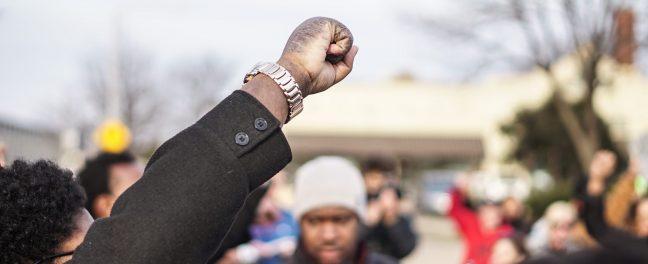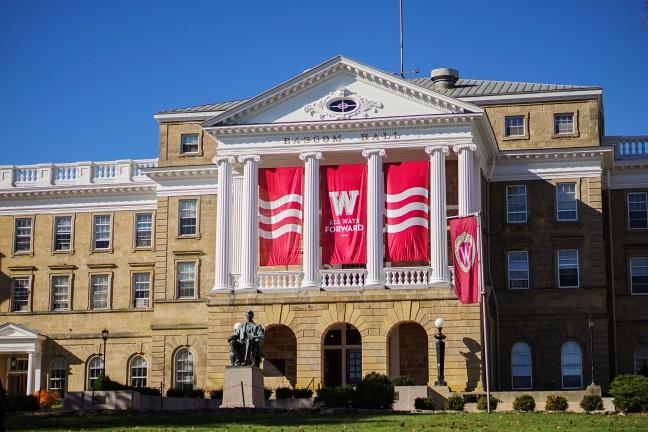Freedom of speech has been an integral principle in American jurisprudence since our country’s conception. Generally, it is an idea celebrated and protected, regardless of political affiliation. Heralded as one of our democracy’s central tenets, it would make sense for it to be continuously upheld.
But with the unprecedented polarization and general hostility which now characterize American governance, freedom of speech — an age-old right guaranteed by the Constitution — is now fair game for partisan dissection and destruction.
College campuses have long served as a battleground for the protection of free speech, and there is no better example of this than the University of Wisconsin. It was on this campus that the UW Board of Regents instituted a free speech policy that drew national attention for its rather harsh punishments against students who are seen to disrupt another’s free expression.
And earlier this week, just down the street from this university, Sen. Chris Kapenga, R-Delafield, and Rep. Cody Horlacher, R-Mukwonago, reintroduced the Campus Free Speech Bill. Prompted by the supposed threat to conservative speakers on college campuses, the bill is explicitly meant to protect free speech at UW campuses by making the Board of Regents responsible for penalizing any actions hindering the free speech of a campus speaker, student or faculty member. Furthermore, the bill allows for the discussion of any subject protected by the First Amendment.
Given our country’s intimate relationship with free speech, this bill and its attendant Board of Regents policy appear admirable on the surface. But implicitly, they miss the point of the First Amendment entirely, asserting that some forms of speech warrant protection, while others should be subject to silencing.
The First Amendment is short. It contains one sentence, 45 words. Perusing its three lines of text, this board has failed to find any mention that exercising one’s free speech also guarantees that no protesters will come to denounce it if they find it objectionable — which people often do when you’re widely seen to spread hate. But more on Ben Shapiro later.
Letter to the Editor: UW System more tolerant of hate than those who stand against it
Put simply, your constitutional right to free speech guarantees that the government will take no role in limiting it. It does not, however, guarantee that you are pardoned from criticism for speaking or absolved of any consequences that may accompany it.
So that brings us to Ben Shapiro, the impetus for this legislation and whose 2016 speech on the UW-Madison campus was met with resistance from those who find his rhetoric reprehensible.
He and the organization he was addressing — the UW-Madison chapter of Young Americans for Freedom — are both avid supporters of laissez faire, free market economics. Evidently, that ideology does not extend to their idea of free speech.
It’s true that Shapiro was repeatedly disrupted by protesters, but it’s also true — and this is the more important truth — that he was ultimately able to deliver his speech. Where this crisis in First Amendment protections has arisen is unclear, at least to this board.
But let’s just say that Shapiro was disrupted, repeatedly, to the point where he could not deliver his speech at all. If we are to take Shapiro at his own words, his rhetoric often debases and dehumanizes Muslim and Arabic people and trans people, and he is the editor-in-chief of a publication that traffics in bigotry. And just last week, he stirred controversy by saying it’s a “you problem” to be dependent on working more than one job to make ends meet.
The protesters who showed up to challenge Shapiro’s speech obviously took issue with the rhetoric he espouses. Per the First Amendment, it is their right to protest his appearance — despite the special protections that Shapiro and his free speech crusaders believe they are owed.
But this debate expands beyond constitutional protections. Ultimately, we could talk in circles for hours about how both groups have a constitutional right to be there and to speak — which they do, and which they did. The real debate for our time is being waged over the impact of hate speech on historically marginalized communities.
The desperately important reality of this debate over free speech is that it is directly linked to the ability of people of color, LGBTQ+ people, those of minority religious traditions — anyone from a historically marginalized group — to feel safe and welcome and accepted in the community.
And when we have identified increased diversity as a desired goal — for our staff here at the Herald, for the student and faculty population at our university, for our country’s leadership, and anywhere else that sorely lacks representation — it is then incumbent upon us to take active measures to cultivate those safe and welcoming and accepting communities.
There are many avenues we can take to achieve that goal — and, indeed, achieving it will require a multi-faceted approach. Here, this issue of free speech plays a significant role.
For UW-Madison, honoring their expressly identified goal of fostering greater diversity means lending more legitimacy to student protesters than to speakers like Shapiro — and not equating hate speech with those who disrupt it.
Conservatives’ self-victimization on college campuses is getting old
For the state of Wisconsin, that means not passing laws like the Campus Free Speech Bill, which says that speakers like Shapiro are more valid and worthy of a platform than his protesters, who are merely there to insist on their own humanity.
For all of us, this requires a fundamental shift in how we approach freedom of expression — for truly “free” expression requires a level playing field, an equal starting line. And you don’t have to be a scholar of history to know that isn’t the case in this country.
All this is to say that the battle for freedom of expression on college campuses is not one of partisanship — rather, it is one of power.
And in that battle of power, speech plays a large role — the pen truly is mightier than the sword. The Campus Free Speech Bill attempts to stifle protest and dissent, inhibiting progress on all fronts. It attempts to tell us which speech matters and which speech doesn’t. And it attempts to prop up dangerous rhetoric in dangerous times.
It is the opinion of this board that it is not the role of Wisconsin’s republican state legislature to manage the flow of ideas and expression on college campuses. This environment should be a marketplace of ideas, but it should also be a place where protest has a greater seat at the table than the bigotry it is protesting — if all our talk about the importance of diversity means anything.
The Editorial Board serves to represent the voice of the Badger Herald editorial department, distinct from the newsroom, and does not necessarily reflect the views of each staff member.













